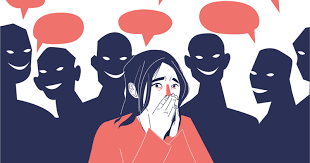Social anxiety disorder is intense anxiety, fear of being judged, negatively evaluated or rejected in social situations. Someone who is suffering from social anxiety disorder may talk about acting or appearing or being viewed as stupid, awkward or boring. Many people with this experience strong physical symptoms as well when they are confronting any feared situations. Being nervous in social situations is quite normal, however, for people suffering with social anxiety disorder, it is so intense that it leads to avoidance of the situation entirely.
An average onset of social anxiety disorder is during teenage years. Individuals who are diagnosed with social anxiety disorder have reported extreme shyness in childhood. But it is important to understand that this disorder is not just “simple shyness”.
Social anxiety interferes in day to day situations and even causes them to completely avoid the situation, knowing that their anxiety is unreasonable. Symptoms can be so extreme that it can make it difficult for them to complete school, appear for interviews, get a job or even have friendships and romantic relationships.
Signs and symptoms of Social anxiety disorder:
Emotional & behavioural symptoms are:
- Constant worry about embarrassing self
- Intense fear of interaction with strangers
- Fear of being judged negatively
- Avoiding speaking to people out of fear of embarrassment
- Avoiding situation that will bring attention to self
- Anxiety while anticipating any feared event
- Expecting the worst possible scenarios in a social situation
Childrens may express their anxiety by crying, having temper tantrums, clinging to parents or refusing to speak in social situations
Physical symptoms are:
- Fast heartbeat
- Trembling
- Sweating
- Nausea
- Dizziness or lightheadedness
- Muscle tension
- Trouble catching your breath
The symptoms change over time. Although avoiding situations that make you anxious may make you feel better in the short term, it may worsen with time. Not all individuals are anxious in all social situations. Some may experience anxiety only in a few and particular situations.
Causes-
Like other mental health conditions, this disorder also arises from an interaction of biological & environmental factors. But few of the possible causes are:
- Inherited traits- Anxiety disorder tends to run in families. However, it is still not clear how much of this is due to genetics and how much is due to learned behaviour.
- Brain structure- Amygdala- a structure in the brain plays a major role in controlling the fear response. People who have an overactive amygdala may have a heightened fear response that may cause anxiety in social situations
- Environment- Social anxiety disorder can be learned behaviour as well- some people may develop anxiety after an embarrassing or unpleasant social situation. Parents who model anxious behaviour, are more controlling or over protective of their children in social situations may also cause an association and lead to the child being socially anxious.
Risks-
There are also certain factors that can increase the risk of developing social anxiety disorder. They are-
- Family history- An individual is more likely to develop social anxiety disorder if your biological parents or siblings have the condition.
- Negative experiences- Individuals who experience bullying, rejection, teasing in their childhood are more prone to this disorder.
- Temperament- Individuals who are shy, timid, withdrawn are at a higher risk.
- Having a condition that draws attention- For eg, facial disfigurement, tremors, etc can increase feelings of self consciousness and may trigger social anxiety disorder in some people.
Complications-
Social anxiety disorder if left untreated can lead to different other concerns like-
- Low self esteem
- Negative self talk
- Poor social skills
- Isolation
- Difficult social relationships
- Low employment achievements
- Substance abuse
- Suicide or self harm tendencies.
Treatment-
Treatment for social anxiety disorder depends on the severity of the symptoms (emotional & physical) and how well you function daily. The length of treatment also varies. Some respond well while others may require some time.
- Medications-
Visiting a psychiatrist and psychologist is very important. On the basis of diagnosis, medicines will be prescribed. Not everyone with social anxiety disorder needs medications. Sometimes when it is at an initial stage, only therapy is also helpful. Several different medications are prescribed for social anxiety disorder. Medications are SSRIs, SNRIs, MAOIs, beta blockers, benzodiazepines.
- Psychological therapies-
Psychotherapy used alone or with medications is an effective form of treatment for anxiety.
- CBT can be very helpful. CBT uses strategies like exposure, cognitive restructuring and social skills training.
- ACT uses techniques that are xperiential, value guided and mindfulness as a part of its therapy.
- Psychoanalysis and psychodynamic therapy involve a therapist helping you to understand underlying issues from childhood that may have contributed to your social anxiety. It is most useful for people who have deeper unresolved conflicts contributing to their anxiety.
A Word From Siraya:Mental Wellness Centre
Reaching out for help can feel uncomfortable and can itself be anxiety provoking. But know that you are taking the best step in the right direction to help yourself better! Connect with our therapist and book an appointment today!

